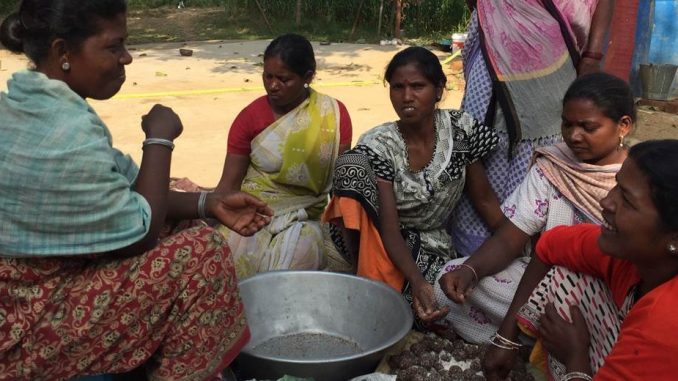
HATWAL, India — A group of about half a dozen women are gathered at a lone cement home in a vast expanse of farmland covered in waist-high wheat and mustard seed plants in tribal Eastern India.
Sitting on the ground around a wicker basket and large silver bowl, the women expertly roll a dough-like mash into balls.
They are making mahua laddoo, a nutritious, sweet snack prepared from the local mahua flower that is integral to their tribal economy but is also used to create moonshine, helping fuel the rampant alcoholism in the area.
Now the women, some wearing ornate saris, are using the mahua to produce jams, jellies, and sweets and then selling them for a profit at local markets, earning additional income and attempting to change the stigma around the local plant. Cooperatives working across the Indian state of Jharkhand, home to more than 30 indigenous tribal groups, are teaching women how to produce and market the items.
“We only knew about its bad side — not its good side and the positive aspects,” Mariana Xalxo, a 32-year-old mother of two leading and advising the cooperative, told NBC News through an interpreter.
Xalxo trained the other women on how to prepare the mahua laddoo, which they sell at a local fair for 10 rupees (about $.15). Xalxo and another woman, Dibiyana Ekka, each invested 350 rupees — or about $5 — to start the cooperative and sell the snack at a local village fair. Their initial investment of 700 rupees earned them 1,500.
“Other women heard and joined and are now taking part,” Vasavi Kiro, who runs Jharkhand-based Torang Trust to improve the lives of tribal people in Jharkhand, told NBC News. Kiro and the nonprofit trust are creating the cooperatives in three areas of Jharkhand, ultimately affecting about 100 women.
Women in India do almost 10 times the amount of unpaid work as men, according to a 2015 report from consulting firm McKinsey&Company examining women’s equality in the country. Most of the unpaid labor is routine housework exacerbated by a lack of clean water and sanitation. Jharkhand — where the mahua cooperatives have started — has been identified in the report as one of the worst states in India for gender parity, on par with war-torn Yemen and Chad.
“The bottom five states account for some 32 percent of India’s female working-age population, representing a large opportunity to improve India’s national position on gender equality,” the report stated.
While the cooperatives are still agriculture-based — the majority of work for rural women in India — they are also creating a sense of entrepreneurship and giving women a chance to earn their own money outside of the home, helping to reshape deep-rooted views on women and their potential in the country, according to Kiro.
The mahua flower blooms in March and April, and is found largely in central and north Indian plains and forests, Kiro said. Though the flowers are used to produce an alcoholic drink, some traditional healers also use the flowers for medicine, treating everything from epilepsy to diarrhea and teeth pain.
“It’s a curse,” Kiro, a former member of the Jharkhand State Commission for Women, said of the alcoholism in the tribal areas spurred by the flower.
The alcoholism has also fueled domestic violence in the homes, something that Ekka experienced. She says her husband, who died from alcoholism, beat her, pulled her hair, and made her life hell. When her husband was drinking, Ekka would take her three children at night to a friend or relative’s home.
“The fear was very strong,” the 37-year-old recalled of that time period in her life.
Xalxo, Ekka, and their team are hoping to change the perception of the natural resource through their cooperative.
“Women are making liquor because they need cash money,” Xalxo said through the interpreter. “So that’s why we have started this — to take positive action.”
According to country-level data compiled by the United Nations in 2013, 37 percent of Indian women have experienced sexual or physical violence in their lifetime by an intimate partner.
In the nearby state of Bihar, alcohol has been banned, but it is also tied to the indigenous peoples’ rituals and customs, so banning it goes against their cultural heritage, said Elina Horo, coordinator of the Adivasi Women’s Network, which offers support, education, rights training, and opportunities for more than 200 adivasi, or indigenous, women in Jharkhand State.
“So if you ban it, the rituals will be banned, too. But if it’s against human rights, then it should be restricted,” she said.
The Adivasi Women’s Network has also trained nearly 50 women to use the mahua flowers to create jams and jellies in a cooperative-style environment.
“Women will say this (the mahua liquor) is the root cause of violence against women because they will beat them after,” Horo said. “They are a model for others. They add value to our traditional food system.”
This story was reported as part of the International Reporting Project in India.
The writer is
Source: NBCNews.com

Leave a Reply